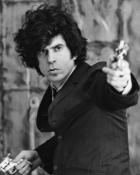
Ian Svenonius hit his first shriek in a delivery room in the United States in 1968. He embraced autonomy when the umbilical cord was cut in an environment of protests, marches for civil rights and countercultural sophlamas. From that moment he did not abandon the screams or the independence. He also grew up right in front of a church where gospel was sung, so it was inevitable that he would become the scenic beast and the strongly ideologized animal he has always been. The icons are made with those wicks, especially if they spend their adolescence in a Washington D. C. secretly burned by a strong circuit of punk-rock and hardcore that had as flag the unbearable commitment and the most brilliant self-management. Wild on stage, but lucid and rigorous in his theories, he always understood the rock and roll band as an avant-garde but popular command. An idea that has been the engine of invented styles such as the gospel yeahyeah and bands such as Nation of Ullysses, The Make-Up or Chain and The Gang, in which aesthetics is a way of ethically positioning itself with the intention of unchecking worst clichés of the music industry.
He took that Marxist and anti-authoritarian rhetoric even to the field of interviews with Soft Focus, the cult interview program he presented on VBS.tv. Crucial figure of the music against, character in the broadest sense of the term, Svenonius is the pop star who travels by subway and plays in civic centers, although he has an extensive network of acolytes and parishioners of his ideas. It is, in short, a kind of underground helmsman in the entire Planet Earth. A reverend of the purest ideas. All this is in satirical essays, deep but prominent as The Psychic Soviet, the Pink Booklet of pop music in the image of Mao's Red Book, or in Supernatural Strategies to set up a rock band, which now presents Blackie Books in Spanish. Ian Svenonius started protesting in 1968 and continues to do so in 2014, because things have not changed so much.




